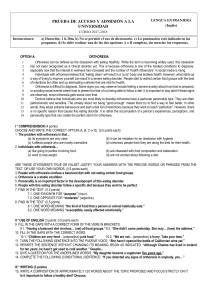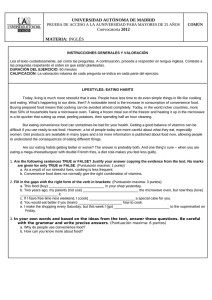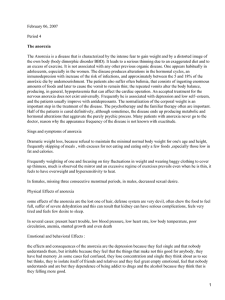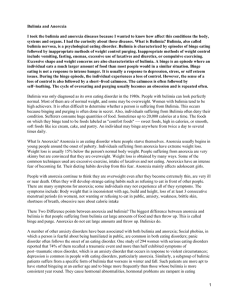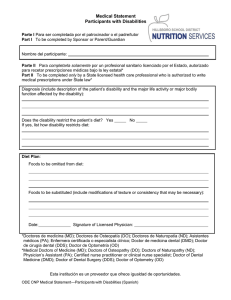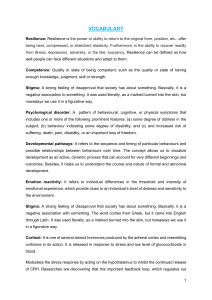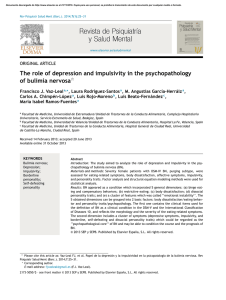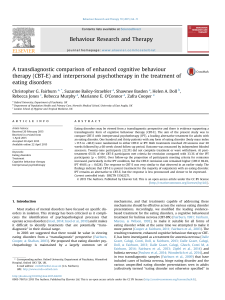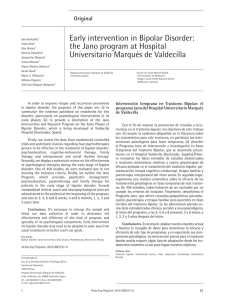Orthorexia nervosa. A new eating behavior disorder?
Anuncio
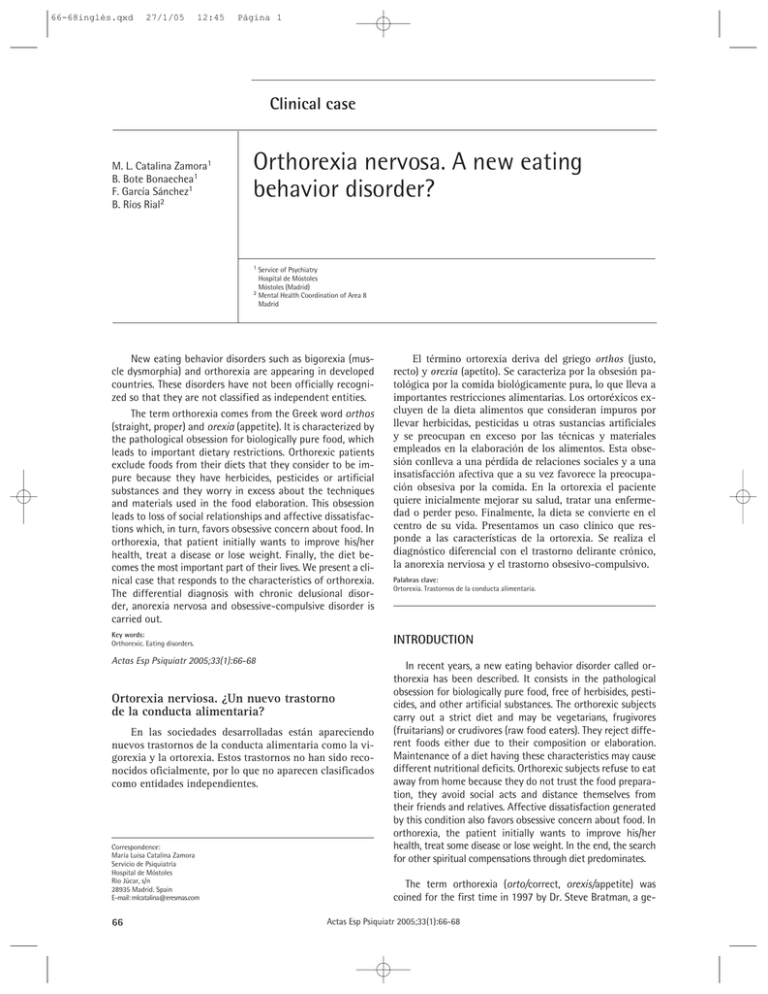
66-68inglés.qxd 27/1/05 12:45 Página 1 Clinical case M. L. Catalina Zamora1 B. Bote Bonaechea1 F. García Sánchez1 B. Ríos Rial2 Orthorexia nervosa. A new eating behavior disorder? 1 Service of Psychiatry Hospital de Móstoles Móstoles (Madrid) 2 Mental Health Coordination of Area 8 Madrid New eating behavior disorders such as bigorexia (muscle dysmorphia) and orthorexia are appearing in developed countries. These disorders have not been officially recognized so that they are not classified as independent entities. The term orthorexia comes from the Greek word orthos (straight, proper) and orexia (appetite). It is characterized by the pathological obsession for biologically pure food, which leads to important dietary restrictions. Orthorexic patients exclude foods from their diets that they consider to be impure because they have herbicides, pesticides or artificial substances and they worry in excess about the techniques and materials used in the food elaboration. This obsession leads to loss of social relationships and affective dissatisfactions which, in turn, favors obsessive concern about food. In orthorexia, that patient initially wants to improve his/her health, treat a disease or lose weight. Finally, the diet becomes the most important part of their lives. We present a clinical case that responds to the characteristics of orthorexia. The differential diagnosis with chronic delusional disorder, anorexia nervosa and obsessive-compulsive disorder is carried out. El término ortorexia deriva del griego orthos (justo, recto) y orexia (apetito). Se caracteriza por la obsesión patológica por la comida biológicamente pura, lo que lleva a importantes restricciones alimentarias. Los ortoréxicos excluyen de la dieta alimentos que consideran impuros por llevar herbicidas, pesticidas u otras sustancias artificiales y se preocupan en exceso por las técnicas y materiales empleados en la elaboración de los alimentos. Esta obsesión conlleva a una pérdida de relaciones sociales y a una insatisfacción afectiva que a su vez favorece la preocupación obsesiva por la comida. En la ortorexia el paciente quiere inicialmente mejorar su salud, tratar una enfermedad o perder peso. Finalmente, la dieta se convierte en el centro de su vida. Presentamos un caso clínico que responde a las características de la ortorexia. Se realiza el diagnóstico diferencial con el trastorno delirante crónico, la anorexia nerviosa y el trastorno obsesivo-compulsivo. Key words: Orthorexic. Eating disorders. INTRODUCTION Actas Esp Psiquiatr 2005;33(1):66-68 Ortorexia nerviosa. ¿Un nuevo trastorno de la conducta alimentaria? En las sociedades desarrolladas están apareciendo nuevos trastornos de la conducta alimentaria como la vigorexia y la ortorexia. Estos trastornos no han sido reconocidos oficialmente, por lo que no aparecen clasificados como entidades independientes. Correspondence: María Luisa Catalina Zamora Servicio de Psiquiatría Hospital de Móstoles Río Júcar, s/n 28935 Madrid. Spain E-mail: [email protected] 66 Recibido el Aceptado el 15-5-02 Palabras clave: Ortorexia. Trastornos de la conducta alimentaria. In recent years, a new eating behavior disorder called orthorexia has been described. It consists in the pathological obsession for biologically pure food, free of herbisides, pesticides, and other artificial substances. The orthorexic subjects carry out a strict diet and may be vegetarians, frugivores (fruitarians) or crudivores (raw food eaters). They reject different foods either due to their composition or elaboration. Maintenance of a diet having these characteristics may cause different nutritional deficits. Orthorexic subjects refuse to eat away from home because they do not trust the food preparation, they avoid social acts and distance themselves from their friends and relatives. Affective dissatisfaction generated by this condition also favors obsessive concern about food. In orthorexia, the patient initially wants to improve his/her health, treat some disease or lose weight. In the end, the search for other spiritual compensations through diet predominates. The term orthorexia (orto/correct, orexis/appetite) was coined for the first time in 1997 by Dr. Steve Bratman, a ge- Actas Esp Psiquiatr 2005;33(1):66-68 66-68inglés.qxd 27/1/05 12:45 M. L. Catalina Zamora, et al. Página 2 Orthorexia nervosa. A new eating behavior disorder? neral physician who formed part of the natural eating movement of the USA, «diet to cure everything». He suffered this disorder that he would define years later in his book «Health Food Junkies»1,2. He also defines certain items that some already consider as diagnostic criteria. Are you spending more than 3 hours a day thinking about a healthy diet? Do you worry more about the quality than the pleasure of meals? Does the quality of your life decrease as the pseudoquality of your diet increases? Do you feel guilty when you stray from your dietary beliefs? Does your way of eating isolate you? Do you plan what you are going to eat in advance? Orthorexia does not appear classified in the diagnostic manuals or in the usual medical searchers since sufficient studies do not exist on the subject. In the USA, there are many hospital admissions recorded due to this problem. In Spain, the data is unknown, but the first cases are appearing. Although there are no epidemiological studies, the incidence could be between 0.5 % and 1 %3 and equally affects both genders. In orthorexic patients, obsessive-compulsive mechanisms with personality traits similar to those of restrictive anorexia nervosa (rigidity, perfectionism, need to control your life transferred to eating), phobic mechanism (intense anxiety regarding certain foods and their avoidance) and hypochondriac mechanisms are described. MEDICAL RECORD A 28 year old woman who is admitted due to severe malnutrition. Iron and vitamin B12 deficit and severe hypoproteinemia stand out in the laboratory analyses. Weight: 27 kg; height: 1.59 m, and BMI: 10.7. The patient had intense acne at 14 years of age that did not improve with conventional treatments. She went to a naturist who recommended that she eliminate fats from her diet. At 16 years of age, she restricted different foods until becoming a lacto-ovo-vegetarian at 18 years of age. At 24 years of age, she eliminated eggs and milk products from her diet. Her weight was around 43 kg (BMI 17). She has never been overweight. Two years ago, she intensified her food restriction and became a strict eater of uncooked vegetables and vegetarian. She changed her way of dressing, only using clothes made of natural fabrics. She progressively isolated herself from her usual setting, almost exclusively relating with groups who shared her ideology. At that time, she began to lose weight. The patient reports that she hardly had time to eat and that she spent all day working. She considers that meals should be eaten slowly, chewing each bite many times and meditating while eating. Given that she did not fulfill these conditions, she only ate once a day and limited amounts. She has amenorrhea and her weight decreased to 35 kg one and a half years ago. After a trip to India, she suffered diarrhea that was treated by partial fasting. Her weight dropped to 27 kg. On examination, the patient had many beliefs about food and the influence of food in the spiritual life of persons and thus in human relationships. She believes that it is not good to mix different types of proteins or nutrients in the same meal, since they produce toxins. The best foods are seeds since they fall to earth in a natural way. The seeds should be ground with natural stones and not by mechanical means. Eggs should not be eaten because «they are the abortion of the hen». The «natural harmony» process should not be broken and this is broken when animals are killed. Raw food vegen diet improves the world and brings «peace of spirit in the person and this person in the world». These overevaluated ideas have no delusional characteristics. She searches for harmony and denies having feelings of sadness or anguish - «the human being is happy if she/he understands that sadness or anguish are something external that must be rejected». During her hospitalization, no typical anorexic behaviors were detected. There was no distortion of the body image, or desire to be thin, the obsessive ideas did not revolve around weight, but rather foods that are healthy according to her criterion. She had no anxiety about progressive weight gain. She had no vomiting or hyperactivity. The denial of feelings and cognitive distortion on her physical condition stand out in the examination. She has never been aware of the seriousness of her malnutrition. DISCUSSION The beliefs of the patient about food and other aspects of «natural life», and her philosophical and religious ideas make it necessary to discard a chronic delusional disorder. In spite of the strong conviction with which she lives these ideas, that are unyielding to logical arguments as occurs in delusions, the pathway by which the ideas are established do not have delusional characteristics. They are overevaluated ideas acquired over the years, very related with her personal history and shared in their content (although possibly not in their intensity) by certain vegetarian and crudivor sectors. Rejection of food in psychotic patients does not have the objective of reaching independence and efficacy as occurs in patients with eating behavior disorders. Furthermore, psychotics who refuse to eat due to delusional causes recognize hunger and weakness. In anorexia, and in this case in orthorexia, there is a perception and interpretation disorder of the body stimuli with denial of the hunger signs, fatigue and weakness4. The harshness of the diet, rumination of the food and rituals related with the act of eating make it necessary to consider the obsessive-compulsive disorder. As in anorexia Actas Esp Psiquiatr 2005;33(1):66-68 67 66-68inglés.qxd 27/1/05 12:45 M. L. Catalina Zamora, et al. Página 3 Orthorexia nervosa. A new eating behavior disorder? nervosa, the obsessive and compulsive symptoms are egosyntonic and are favored by malnutrition. Weight recovery improves the seriousness of the obsessive symptoms, although obsessive traits remain5. The third diagnosis to be considered is anorexia nervosa masked by vegetarianism. One of the reasons that can lead an adolescent to become a vegetarian and maintain this type of eating is his/her desire to lose weight. In this case, against the diagnosis of anorexia, is the fact that she does not refuse to gain weight, she does not show anxiety or fear regarding the progressive increase of her diet and weight; there is no distortion of her body image or desire to be thin and no anorexigenic behaviors are detected (no vomiting, use of laxatives or increase of activity). The diagnosis suggested is that of orthorexia, a picture that is still not accepted, nor well-defined, that would be included among unspecified eating behavior disorders6,7. It is a pathological obsession for biologically pure and healthy food that leads to the restriction of a large number of foods with the consequent weight loss and malnutrition. There is an intense fear of eating contaminated or unhealthy foods and a ritualistic attitude around food and its preparation. both disorders share many characteristics. In both, behavior and life of the patient revolve around food, the diet provides them an identity. This obsessive concern for food favors social isolation. The orthorexic patients could share obsessive traits of personality, basically rigidness and perfectionism, with the restrictive anorexic subjects. In the case described, as in anorexic patients, we observe the cognitive distortion of her physical condition, with denial of the body signs of weakness and fatigue and alexithymic characteristics with tendency to denial of feelings and conflicts. REFERENCES 1. 2. 3. 4. 5. 6. The fundamental difference with anorexia is that in orthorexia, there is no fear of gaining weight, but rather to certain foods, considered as impure and toxic. However, 68 7. Bratman S, Knight D. Health food junkies; orthorexia nervosa: overcoming the obsession with healthful eating. New York: Broadway Books, 2001. Fugh-Berman A. Health food. JAMA 2001;285:2255-6. Calañas Continente A. Ortorexia: un trastorno nutricional de los países desarrollados. Revista de Nutrición Práctica 2003;7:47-50. Bruch H. The golden cage: the enigma of anorexia nervosa. New York: Vintage Book, 1979. Holden NL. Is anorexia nervosa an obsessive-compulsive disorder? Br J Psychiatry 1990;157:1-5. DSM-IV. Manual diagnóstico y estadístico de los trastornos mentales. Barcelona: Masson, 1998. CIE-10. Clasificación internacional de enfermedades. Madrid: Organización Mundial de la Salud, 1992. Actas Esp Psiquiatr 2005;33(1):66-68
